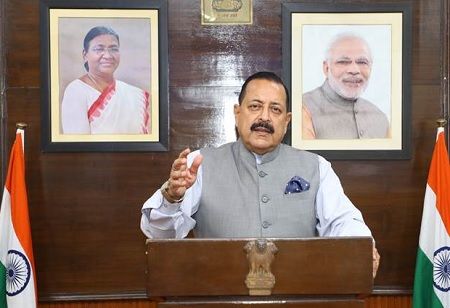
Dr. Jitendra Singh Inaugurates India's First Biopolymers Demonstration Facility in Pune

 The Union Minister of State (Independent Charge) for Science and Technology Shri Jitendra Singh inaugurates today the country's first Demonstration Facility for Biopolymers at Jejuri, Pune. Developed by Praj Industries with its prime objective on production of Polylactic Acid or PLA bioplastic-an eco-friendly alternative to conventional fossil-based plastics.
The Union Minister of State (Independent Charge) for Science and Technology Shri Jitendra Singh inaugurates today the country's first Demonstration Facility for Biopolymers at Jejuri, Pune. Developed by Praj Industries with its prime objective on production of Polylactic Acid or PLA bioplastic-an eco-friendly alternative to conventional fossil-based plastics.
He described it as a crucial development in the country's journey toward more earth-friendly solutions. "This demonstration facility marks a key moment in India's commitment to reducing plastic pollution. It showcases our ability to produce bioplastics with indigenous technology and reminds ourselves and the world that we are resolved to shift away from fossil-based plastics to sustainable, eco-friendly alternatives," he said.
The launch of this facility aligns with India's holistic goals of sustainable growth and environmental responsibility, in consonance with Prime Minister Narendra Modi's vision for a "Net Zero" carbon economy as well as the 'Lifestyle for the Environment (LiFE)' initiative that he launched in 2022. The Minister also said that the Indian bioeconomy has grown substantially, crossing over $150 billion in 2023 and slated to reach $300 billion by 2030. This trajectory explains how India is progressing in the direction of economic self-reliance under the 'Atmanirbhar Bharat' initiative with biosafety, ethics, and all-round growth.
This facility falls under the BioE3 (Biotechnology for Economy, Environment, and Employment) Policy that has recently been adopted by the Union. According to it, sustainable development is expected to be encouraged by it, especially in the wake of some of the challenges currently affecting global sectors such as climate change, exhausting non-renewable resources, and waste management challenges. This plant is proof of our ability to lead in the biotechnology sector and a demonstration of how India could offer solutions to the global plastic crisis with the development of its bioeconomy, said Dr. Singh.
India's biotechnology sector is gaining momentum. The country has now ranked 12th in the world and 3rd in the Asia-Pacific region in biotech advancement. The country, claims Dr. Singh, is the largest vaccine manufacturer in the world and the world's third-largest startup ecosystem. In the biotech start-up ecosystem, of course, it has witnessed exponential growth - from around 50-odd in 2014 to more than 8,500 in 2023 - alongside the setting up of 95 bio-incubators, it symbolized the nation as a sector that would give India its future-shaped economy.
Dr. Singh also underlined how innovation must be driven by collaboration between industry, academia, and government in his address. He talked of research and development in translating exciting ideas into real-world solutions: "This facility is not only a technological achievement but also a symbol of India's ability to lead in sustainable innovation".
He ended with hopes for the future of biotechnology in India by calling for all hands to be put together to take the country to its long-term ambition over the next 25 years. He said that this facility is an important step toward fulfilling the vision of "Amrit Kaal," where the country can show its propensity to be a world leader in both biotechnology and sustainable development.